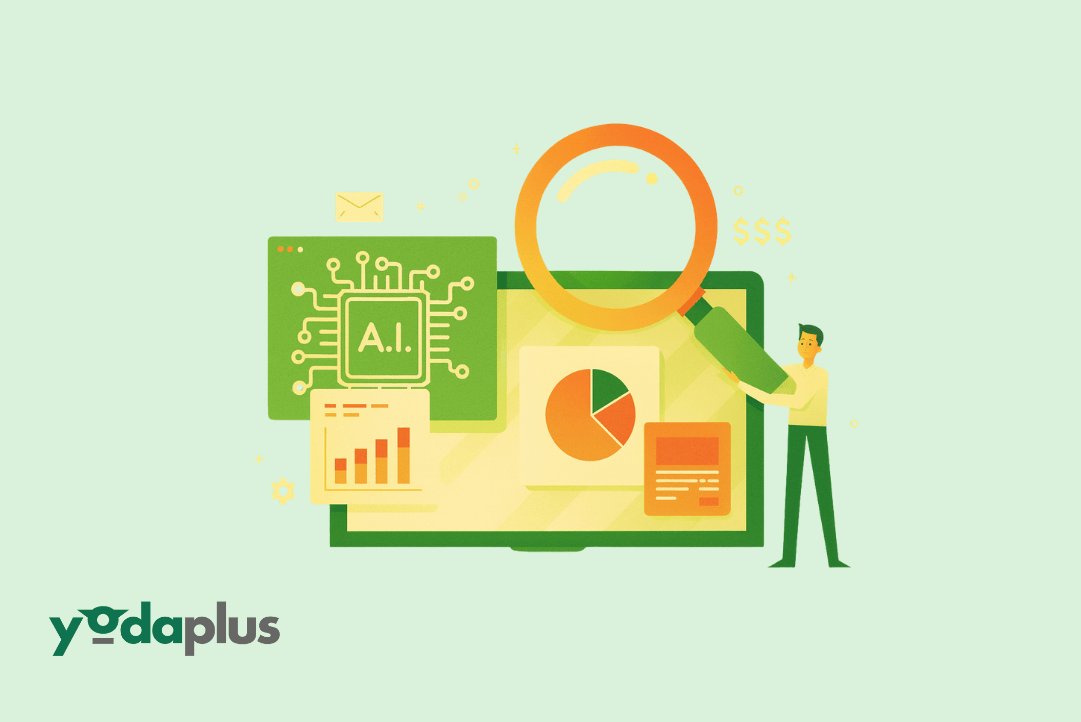
How AI Is Changing the Way We Analyze Markets
August 19, 2025 By Yodaplus
Markets have always been influenced by data, but the way that data is analyzed has changed dramatically. Traditional equity research relied on manual reviews of financial reports, detailed equity research reports, and fundamental analysis to guide investment decisions. Today, Artificial Intelligence (AI) is transforming the process by adding speed, depth, and new forms of insight.
For financial advisors, asset managers, and investment analysts, AI means more than efficiency. It means shifting from reactive analysis to predictive insights. In this blog, we will look at how AI is reshaping investment research, supporting financial consultants, and driving better strategies for portfolio managers and wealth advisors.
From Traditional Research to AI-Driven Insights
Traditionally, equity research combined financial accounting, valuation methods, and performance measurement to understand company health and industry positioning. Analysts prepared detailed equity research reports with commentary on market trends, geopolitical factors, and company outlooks.
With AI, processes like risk analysis, market risk analysis, and portfolio risk assessment can be automated with ai data analysis. AI report generators can compile raw numbers into actionable reports, while equity research automation reduces the manual effort of tracking thousands of data points.
This shift allows professionals to focus less on collecting data and more on developing an investment strategy.
AI in Investment Research
Investment research is evolving with tools that use machine learning and ai for equity research. Analysts no longer need to rely solely on quarterly financial reports or static audit reports. Instead, they can monitor market trends and macroeconomic outlooks in real time.
Key Benefits of AI in Investment Research
-
Portfolio Insights: AI scans performance data across companies to highlight portfolio insights and risks.
-
Geographic Exposure Tracking: Automated tools identify risk tied to specific regions, helping investors adjust for geopolitical factors.
-
Scenario Analysis: AI models simulate multiple outcomes, from market shocks to regulatory changes, strengthening risk mitigation planning.
-
Equity Valuation: By combining fundamental analysis with real-time data, AI supports more accurate equity valuation.
This allows investment analysts and financial data analysts to recommend strategies with stronger evidence and faster turnaround.
The Role of AI in Financial Reporting
AI is not only changing research—it is reshaping how financial reports are created and understood. Tools powered by ai for data analysis now:
-
Automate financial risk assessment by scanning for anomalies.
-
Link audit reports directly to performance dashboards.
-
Help investment banking teams prepare forecasts and revenue projections.
-
Reduce errors by aligning financial accounting with compliance frameworks.
For portfolio managers and wealth managers, this means quicker access to reliable information, improving risk mitigation and investment strategy execution.
AI-Powered Risk Analysis
Markets are full of uncertainty, and AI is helping professionals manage it better. Through financial modeling and valuation methods, AI tools assess risk scenarios more comprehensively.
For example:
-
Market Risk Analysis: Identifies volatility patterns that may affect investments.
-
Portfolio Risk Assessment: Detects overexposure in specific industries or regions.
-
Risk Assessment Dashboards: Give a consolidated view of threats, from geopolitical risks to currency fluctuations.
By combining traditional equity analysis with predictive AI models, investors can design portfolios that balance growth with protection.
Investment Banking and AI
In investment banking, AI is already a game changer. Firms use it to strengthen deal evaluations, enhance valuation methods, and track market sentiment analysis. AI tools can pull insights from analyst reports, audit reports, and macroeconomic outlooks faster than traditional teams could.
This helps bankers deliver sharper recommendations for mergers, acquisitions, and value investing or growth investing opportunities.
The Human + AI Balance
Even as AI takes over repetitive tasks, the human role remains central. Financial consultants, analysts, and wealth advisors still interpret results, manage client expectations, and design strategies aligned with personal goals. AI enhances these professionals rather than replacing them.
By automating equity search automation, ai report generators, and data collection, AI allows humans to focus on responsible investment strategies, communication, and high-level decision-making.
Conclusion
AI is not just a tool for efficiency. It is reshaping how we understand and act on market information. From equity research reports to audit reports and financial reports, AI speeds up analysis, improves risk mitigation, and supports stronger investment strategies.
With solutions like GenRPT Finance by Yodaplus, financial advisors, asset managers, and portfolio managers gain the ability to query data directly from reports and documents through a conversational interface. This means less time spent gathering and structuring data, and more time building trust, shaping strategies, and delivering value.
The future of market analysis will rely on combining human expertise with AI-driven insights. This ensures decisions are faster, more reliable, and better aligned with a constantly changing global economy.